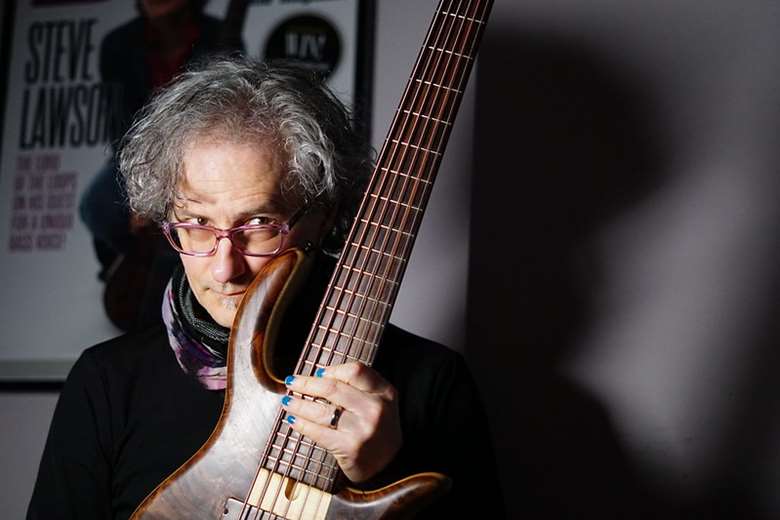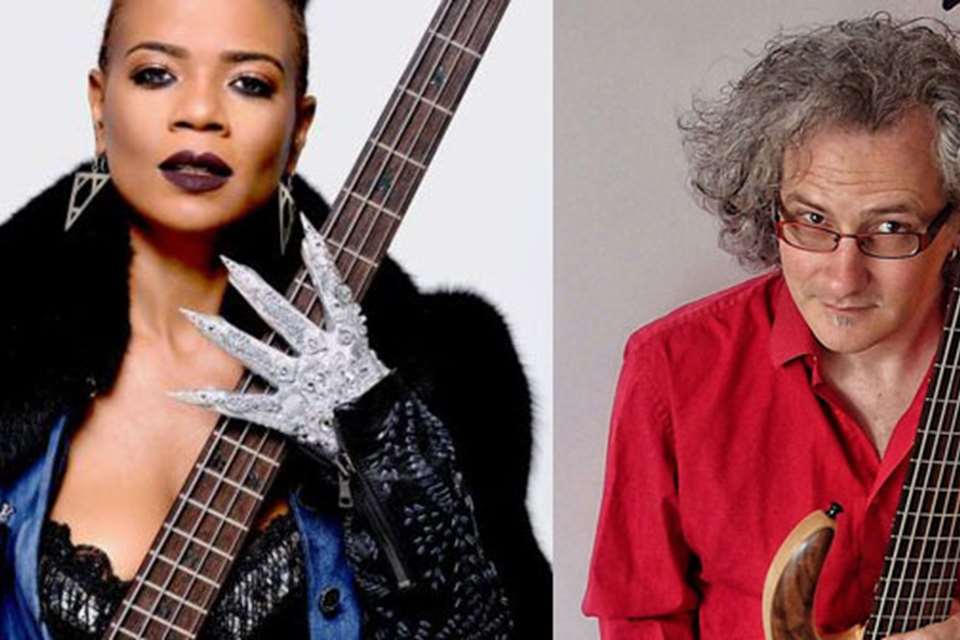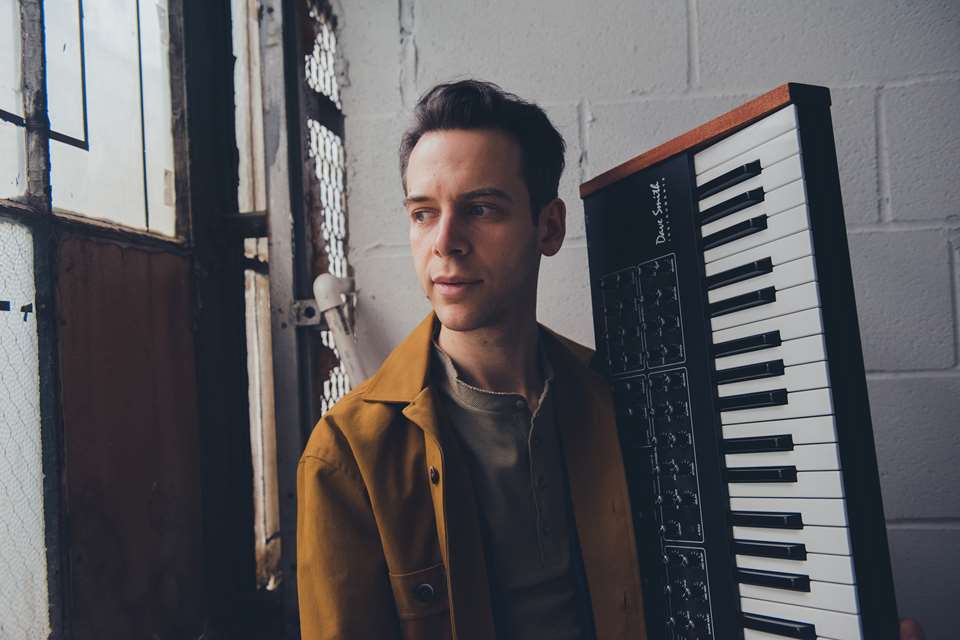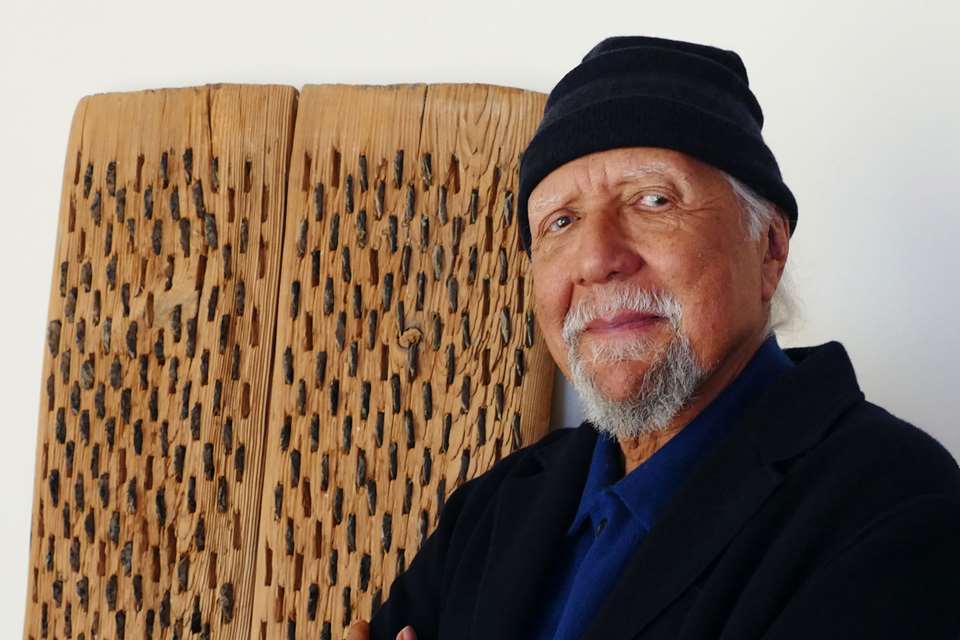How to make money from your music today - Steve Lawson on surviving and thriving online
Mike Flynn
Tuesday, June 30, 2020
As the post-pandemic paradigm begins to unfold, jazz musicians will need to find new ways to engage, entertain and be supported by their fans. Mike Flynn spoke to bassist and self-sustaining solo artist Steve Lawson about how he’s cultivated an online musical eco-system that thrives on both improvisation and innovation

For some, Friday, 20 March, 2020, was the first time they’d visited www.bandcamp.com – as the site waived its usual 15% revenue share to give artists hit hardest by the Covid-19 crisis a 100% share of any sales that day. It was a huge success, generating over $4million in music and merch sales, while the second day on 1 May raised a further $7.1million. The first Friday of each month will repeat this act of largesse. Established in 2008, Bandcamp allows musicians to upload their music in a wide range of lossy and lossless formats, while there are increasing amounts of vinyl, CDs and band merch on sale – with the site even pioneering its own on-demand LP pressing service: if there are enough pre-orders for a vinyl version of an album, Bandcamp will press it. No label required here folks! It’s an artist-led set-up that sees any money spent going directly, and quickly, into the pockets of the musicians, who collectively earned over $270million through the site in 2018.
Birmingham-based solo electric bassist, looping and effects guru Steve Lawson was an early adopter to the Bandcamp model and now offers listeners a Subscription – which for a single yearly payment of £30 allows access to his entire back catalogue of some 58 albums, several new ‘subscriber-exclusive’ albums released each year, as well as exclusive videos, regular blog posts, and some fun Zoom hangouts, which have connected him to his fans around the world.
Everyone’s overcharging for digital downloads, not realising that we really need to make the case for this being a viable alternative to the streaming economy
Steve LawsonIt’s all a far cry from the mixed fortunes offered by streaming sites or relying on gigs to sell physical products direct to fans, as Lawson explains: “I actually find it really weird that it’s taken this long for jazz musicians to see just how terribly streaming rates work out for us. The entire economic proposition is ‘end up on a playlist or have a viral hit and you’ll make money’ – that’s a pop construct, or perhaps even an ambient music construct if you’re hoping to get on a ‘sleep playlist’ or one for people to write to. It’s not a good thing for people who want their ongoing work to be self-sustaining, rather than be the production of a series of lottery tickets. What’s even weirder to watch now is an entire generation of jazz musicians trying to work out what their work is worth when all they know is streaming for free or a CD costing £10 on a merch table. So everyone’s overcharging for digital downloads, not realising that we really need to make the case for this being a viable alternative to the streaming economy, not a replacement for the merch table.”
This holistic approach to continual engagement favours personal interaction over hard-headed promo and sees Lawson spin multiple discussion topics and snippets of music and intellectual stimuli across his social media channels. It’s all part of a two-way conversation that feeds into his music making: “I love the semiology of ‘the album’ but I also love the multi-modal nature of the internet, that a stream of words and images and video and narrative and politics and family life and friendships and, yes, music can all weave into one another and build a compelling vision for how we might move forward as humans. That sounds like a huge claim to make, but it feels like the opposite, like it’s focussing music on a much smaller target, of making sense of the world as I see it day to day, rather than measuring the value or success of anything by its scale as a commercial or broadly cultural artefact. I don’t need to have a hit record for that multimodal narrative to do its job.”
This joined-up thinking extends to making music that responds to current events, be they intimate personal experiences or something as seismic as the current coronavirus-induced crisis.
His latest album, Scenes From The Dystopia, provides an aptly unsettling soundtrack for our disrupted and disturbing times, and it’s thanks to his ability to perform, produce, record and master his own music that enables Steve to do this in such challenging circumstances: “That ability to see what’s going on and respond is incredibly, creatively speaking, freeing and inspiring. If I’d recorded a bunch of stuff that was meaningless, I could’ve shelved it and remained quiet, continued to chat to my subscribers on Zoom about other things, and waited for the next music with meaning to emerge. But as soon as the music means something, I can release it, and I can then group it in ways that emerge over time – the Scenes From The Dystopia album started as a single track, was ‘finished’ after three tracks, but then I recorded a new thing that fitted the theme, journey and purpose of the album so well, I was able to just add it in. It’s pretty exhilarating to be presented with so many ways to contextualise any one performance.”
Full Q&A with Steve Lawson
When did you first start selling your music purely as downloads?
The last time I made a CD of anything was in 2013, when I produced a double CD of the best-of the FingerPainting sessions with Daniel Berkman. Since then, aside from selling a USB Stick of my entire back catalogue at gigs, I've only sold digital.
Did you speak to Bandcamp about how they could develop their subscription model?
Indeed – through a connection via a mutual friend, I started meeting up with Ethan Diamond – Bandcamp's CEO – whenever I was in the Bay Area. Over the years I made a lot of suggestions for things that I'd love to see happen with the site. Some of them were already in the pipeline, some were 'yeah, that's great but we're not going to do that' and others ended up in the system. With the subscription, I can't remember if I asked for something like it before they said 'we're going to be trialling this, how would you like it to work?' but I definitely had input, and then when they did the original beta launch, I was one of the three artists who got to use it for a year before they made it public, which was pretty exciting!
How does the subscription work and are there different ways of doing it?
It's pretty simple – you can set your pricing as monthly or yearly, you can do multiple tiers if, for example, you want to have one set of pricing that automatically gives people access to physical copies of the music. You can decide how much of your existing catalogue your subscribers have access to, and then make each new release either exclusive to them, public but available to current subscribers or public and part of the ongoing subscriber catalogue for new subscribers. You can also message them exclusively, and upload video that only subscribers can access. So there are a few different ways to calculate the value metric.
It's interesting how this crisis for musicians has also highlighted the poor returns streaming generates too...(not really a question I know!) any thoughts on that?
I actually find it really weird that it's taken this long for jazz musicians to see just how terribly streaming rates work out for us. The entire economic proposition is 'end up on a playlist or have a viral hit and you'll make money' – that's a pop construct, or perhaps even an ambient music construct if you're hoping to get on a sleep playlist or one for people to write to. It's not a good thing for people who want their ongoing work to be self sustaining, rather than be the production of a series of lottery tickets.
What's even weirder to watch now is an entire generation of jazz musicians trying to work out what their work is worth when all they know is streaming for basically free or a CD costing £10 on a merch table. So everyone's overcharging for digital downloads, not realising that we really need to make the case for this being a viable alternative to the streaming economy, not a replacement for the merch table.
You're very self sufficient as a musician as you mix and master your own music as well as design the artwork – do you have any advice on how other musicians could broaden their skill set?
Be curious about how that stuff works! I really feel for musicians who are wedded to this idea that their ideal state is just 'instrumentalist', that somehow the system has failed them because they can't just play all day and have other people to take care of that stuff. Making records is such a fascinating process and one that informs your sense of what the music is and what it can become. I did a mastering course a few years back and it not only made it easier for me to master my own recordings, it made be a better musician because I know what I'm listening for in the big picture rather than just my own instrument bubble.
The key learning process is iteration – it's what people do when they're learning how to solo over changes anyway. Do it, then do it again, and again, at different jam sessions and different contexts through every key. Do the same with a mix. Mix a track, then start again. Go away and spend a day listening to other people's records, then do it again. Each time, you'll get better, eventually, you'll be happy to release it. Use it as a chance to get deep inside the sound of your own music and its intentions.
You're a prolific 'blogger' (old speak!) and always maintain consistent trains of thought across all your social media channels as well as your Bandcamp page – is this an extended part of your creative thinking and engagement with your audience?
I do like to think out loud for a number of reasons. Firstly, my online community is really smart, so I get input from other smart people about ideas – whether creative, economic, cultural or academic. Secondly, it all funnels towards the music – what I do makes way more sense if you hear it as the soundtrack to this entire way of engaging with the world. I love the semiology of 'the album' but I also love the multi-modal nature of the internet, that a stream of words and images and video and narrative and politics and family life and friendships and – yes – music can all weave into one another and build a compelling vision for how we might move forward as humans. That sounds like a huge claim to make, but it feels like the opposite, like it's focussing music on a much smaller target of making sense of the world as I see it day to day, rather than measuring the value or success of anything by its scale as a commercial or broadly cultural artefact. I don't need to have a hit record for that multimodal narrative to do its job.
How has this way of working shaped your creative process?
It's allowed me to make music to a completely different timescale. Making it for an existing, engaged community of subscribers means I can be WAY more prolific than any record deal would allow for, and I can present the music within that broader social context. I can share a whole string of stuff as videos building up towards a more focussed album release. I can finish an album in a day – like so many of the great jazz albums of history – but instead of slotting it into a schedule, I can put it out and allow the community to establish a collective response and sense of its meaning to them at that time, to the point where I no longer think of them as an 'audience' in the binary artist/audience sense, rather a community of practice who engage with the work and shape where it goes, though it's interesting that no-one ever says 'here's what you should do' – it's a remarkably respectful set of engagements around what this work might mean and where it might go next!
Any thoughts on how musicians emerge from the current crisis and balance virtual performances with real-world human interaction?
I find the pitting of the two as some kind of equivalent rather curious – they both exist as completely separate experiences and processes. I've had some amazing experiences playing streaming gigs over the years, but throughout this have felt no compulsion to do it at all. The thing I miss about gigs is getting to hang out with the people who make it all possible, and getting to make records – the vast majority of my collaborative releases are live shows. So I miss that, but I don't see streaming gigs as some kind of simulacrum of in-person gigs. They have a completely different set of possible interactions attached, and the possibility to archive it or release it as a higher res version immediately afterwards is great fun. For example, Liam Noble's Saturday piano gigs aren't a thing that would ever have happened in any 'live' gig setting and yet they fill me and everyone who sees them with joy. They're not audiophile, or perfected, and yet to experience his exploratory approach to this incredibly broad repertoire of music that's capturing his imagination in such an intimate way is a true gift. I'm deeply grateful for that opportunity. I hope that we keep the best of that kind of music making and its specific beauty and curiosity beyond this time of isolation.
I like the fact your most recent release is inspired by the dystopian scenes unfolding every day all over the world... it would have been almost impossible to do that if you were signed to a label and had to release this music via them and their schedule right?
Totally. That ability to see what's going on and respond is incredibly creatively freeing and inspiring. If I'd recorded a bunch of stuff that was meaningless, I could've shelved it and remained quiet, continued to chat to my subscribers on Zoom about other things, and waiting for the next music with meaning to emerge. But as soon as the music means something, I can release it, and I can then group it in ways that emerge over time – the Scenes From The Dystopia album started as a single track, was 'finished' after three tracks, but then I recorded a new thing that fit the theme, journey and purpose of the album so well, that I was able to just add it in. It's pretty exhilarating to be presented with so many ways to contextualise any one performance.
We have so many ways to reimagine what it is to be a musician and the present our work – live, recorded, written, remixable, collaborative, solo, epic, funded, personal – it's a bit of a leap from the recording/album release/promo/tour cycle that the existing system was built to accommodate, and there are times you need to realise that certain aspects of change aren't backwards compatible – for example, I REALLY struggle to get touring happening, because tours tend to be booked a certain period in advance and I never have an idea what I'll be doing 10 months from now. I don't know who I'll be working with, or what my own music will have become. I certainly have no idea what the current album will be, given that in all likelihood I'll have released anywhere up to 9 or 10 full-length recordings in that time.
So I've had to create other niches for live performance too, but those are in response to me having spent 20 years questioning the various orthodoxies and focussing on the sustainability of the music. Can I keep doing this? What are the aspects of failure or success that would get in the way of the creative thing that I care about? As an improvisor, having a 'hit' of any sort would be a giant pain, because I'd be left with an audience expecting me to play that piece of music again.
I've worked to cultivate an expectation within my community of excitement around new work, not nostalgia for what's gone before. Those recordings exist, and some people love them which is wonderful, but I'd hate to feel obliged to revisit stuff that I was doing 20, 15 or even 5 years ago – it's done, and I've moved on. I'm not sure most labels would be comfortable with much of that...
The next Bandcamp Friday is on 3 July – and to find out more about Steve Lawson’s Bandcamp subscription scheme and to hear Scenes From The Dystopia, visit www.music.stevelawson.net


